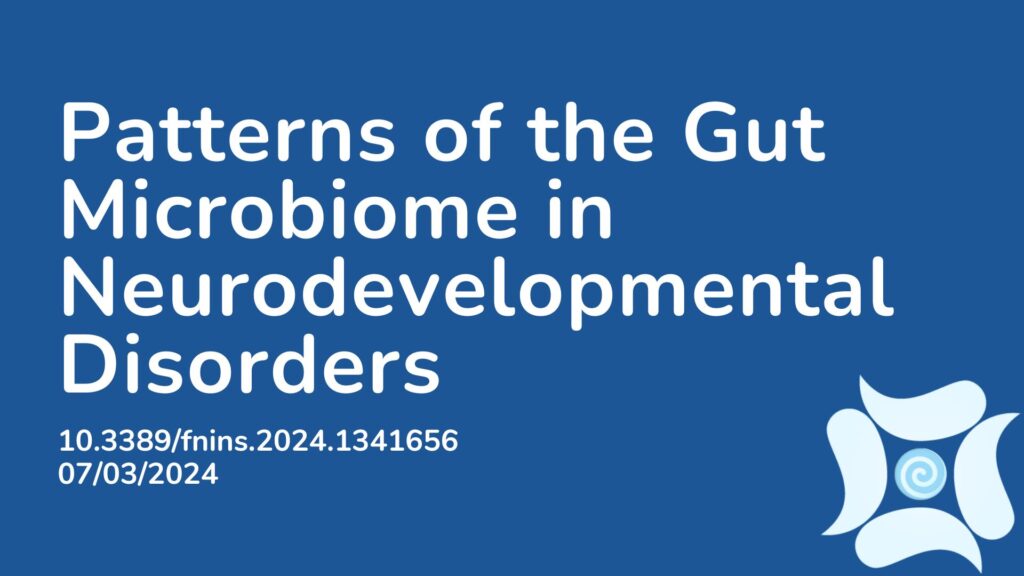Summary:
The advances in microbiome research have greatly improved the understanding of neurodevelopmental disorders, with evidence suggesting that early-life factors, combined with genetic and environmental triggers, can influence neurodevelopment, leading to long-term behavioral and cognitive changes. This has been observed in conditions such as autism spectrum disorder (ASD), attention deficit hyperactivity disorder (ADHD), and Rett syndrome (RETT). ASD is characterized by difficulties in social interaction, communication, and behavior. ADHD involves deficits in reward processing and is linked to genetic abnormalities in dopamine, serotonin, and noradrenaline pathways. RETT, a rare genetic disorder primarily affecting females, is caused by mutations in the MeCP2 gene and results in the loss of motor and communication skills. Individuals with these disorders often experience gastrointestinal issues, and the gut microbiome, which communicates with the central nervous system via the gut-brain axis, may influence brain function and behavior. Early life is a critical period during which brain development and gut microbiota evolution occur, making it particularly sensitive to environmental factors that can impact long-term mental health. Disturbances to the gut can disrupt the gut-brain axis, leading to altered brain function. This review examined the role of the gut microbiome in ASD, ADHD, and RETT by analyzing existing literature, including 18 studies on ASD, 7 on ADHD, and 3 on RETT. The results showed that individuals with ASD and ADHD had decreased levels of particular microbial strains and increased levels of others in their gut microbiota. Proinflammatory cytokines, short-chain fatty acids, and neurotransmitter levels were altered in ASD and RETT patients. Constipation and visceral pain were linked to changes in gut microbiota in ASD and RETT. In ADHD, hyperactivity and impulsivity were negatively associated with particular microbial strains. Probiotic treatments with Lactobacillus sp. and fecal microbiota transplants reduced constipation and improved ASD symptoms in children. The administration of Lactobacillus sp. also prevented the onset of Asperger’s and ADHD symptoms. Micronutrient supplementation improved ADHD symptoms without significantly changing the microbiota composition.
Abstract:
Critical phases of neurodevelopment and gut microbiota diversification occur in early life and both processes are impacted by genetic and environmental factors. Recent studies have shown the presence of gut microbiota alterations in neurodevelopmental disorders. Here we performed a systematic review of alterations of the intestinal microbiota composition and function in pediatric and adult patients affected by autism spectrum disorder (ASD), attention-deficit/hyperactivity disorder (ADHD), and Rett syndrome (RETT). Methods: We searched selected keywords in the online databases of PubMed, Cochrane, and OVID (January 1980 to December 2021) with secondary review of references of eligible articles. Two reviewers independently performed critical appraisals on the included articles using the Critical Appraisal Skills Program for each study design. Results: Our systematic review identified 18, 7, and 3 original articles describing intestinal microbiota profiles in ASD, ADHD, and RETT, respectively. Decreased Firmicutes and increased Bacteroidetes were observed in the gut microbiota of individuals affected by ASD and ADHD. Proinflammatory cytokines, short-chain fatty acids and neurotransmitter levels were altered in ASD and RETT. Constipation and visceral pain were related to changes in the gut microbiota in patients affected by ASD and RETT. Hyperactivity and impulsivity were negatively correlated with Faecalibacterium (phylum Firmicutes) and positively correlated with Bacteroides sp. (phylum Bacteroidetes) in ADHD subjects. Five studies explored microbiota-or diet-targeted interventions in ASD and ADHD. Probiotic treatments with Lactobacillus sp. and fecal microbiota transplantation from healthy donors reduced constipation and ameliorated ASD symptoms in affected children. Perinatal administration of Lactobacillus sp. prevented the onset of Asperger and ADHD symptoms in adolescence. Micronutrient supplementation improved disease symptomatology in ADHD without causing significant changes in microbiota communities’ composition. Discussion: Several discrepancies were found among the included studies, primarily due to sample size, variations in dietary practices, and a high prevalence of functional gastrointestinal symptoms. Further studies employing longitudinal study designs, larger sample sizes and multi-omics technologies are warranted to identify the functional contribution of the intestinal microbiota in developmental trajectories of the human brain and neurobehavior.
Article Publication Date: 07/03/2024
DOI: 10.3389/fnins.2024.1341656



